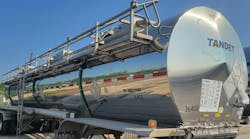IN SOME ways, Fort Transfer is a tank truck carrier in transition as it develops new business opportunities. At the same time, the management team is taking care to ensure that the company does not stray from the core values that formed a solid foundation for more than 90 years.
Over the past couple of years, Fort Transfer’s leadership has worked aggressively to reposition the Morton, Illinois-based company as more of a liquid bulk solutions provider. In addition, they are developing a portfolio of logistics services and exploring opportunities to expand the company’s terminal network into new geographic areas.
“My father has always said that we have to be willing to change with the times, and we must look for new opportunities,” says Brad Kahler, Fort Transfer president and chief executive officer. “That is exactly what we are doing. This company has always been willing to embrace change and new opportunities.
“Our current program is part of a five-year growth plan that is aimed at generating 15% annual growth. Our objective is to diversify from herbicides and other agricultural chemicals that currently generate most of our revenue. We’re not going to leave ag chemicals. We just want to minimize the seasonality that is tied to those products. We want to keep our drivers busy throughout the year.”
Logistics portfolio
Chad Humphrey, Fort Transfer chief operating officer, adds that the carrier’s logistics portfolio includes an asset support team that has more than tripled backhauls over the past year. “Our fleet has gone from being loaded just one way, and we are building a solid general chemical backhaul network,” he says. “Our revenues are up 8% year over year, and general chemicals account for roughly 45% of our overall revenues.”
While logistics management really is nothing new for Fort Transfer, the carrier wants to do it for a broader range of customers. “For years now, we have handled transloading, storage, and distribution of herbicides for chemical producers serving the agricultural sector,” Humphrey says. “We want to expand our logistics services to cover general chemicals, including fleet management and load brokerage.”
Change really is nothing new for the tank truck carrier. About the only thing that has not changed over more than nine decades is the company’s name.
Fort Transfer was established in 1925 by George Fort and was strictly a farm-to-market and local freight delivery company serving central Illinois in those early years. The company started with one milk truck. Notably, Fort Transfer was the second company granted Illinois Operating Authority.
In 1975, Roger Kahler purchased Fort Transfer, merged it with his father’s excavation company, Ervin Kahler Inc, and adopted the Fort Transfer name for the whole operation. Today, daily management of the company has passed to the third generation—Brad Kahler.
“I started out in the maintenance shop cleaning out trucks and picking up trash,” he says. “Over the years, I worked in every department. When I came back to the company in 2002 after college and two years in another business, I was willing and ready to take on a bigger role.”
Hazmat shift
The trucking company gradually changed its operational focus over the years to include the transportation of hazardous materials. Fort Transfer expanded into hazardous waste cleanup in the 1960s and 1970s, and transport of agricultural chemicals was added in the 1980s.
Until recently, the biggest move into hazmat was in 1986 when the carrier built a 2.6 million gallon indoor, climate-controlled storage facility for herbicides in Morton. Fort Transfer transports millions of gallons of agricultural chemicals annually to farm supply dealers and distributors throughout the United States.
The company’s liquid bulk storage site services some of the most respected chemical manufacturing companies in the United States. Since the first phase opened in 1987, Fort Transfer has safely stored and transferred in excess of 350 million gallons of liquid bulk products in a completely temperature controlled environment. Agricultural chemicals can be transloaded at the rail siding that is adjacent to the Morton terminal.
Enclosed within the storage facility are 62 tanks with capacities of 20,000 and 50,000 gallons. The temperature inside the building is kept at 55° F, and recirculation pumps ensure that product does not settle out.
Product storage and transfer operations are largely automated. Pumps can transfer product at 250 to 400 gallons per minute. Valves on the storage tanks are air and electrically operated.
Brad Kahler makes it clear that with all of the herbicide logistics infrastructure in place, Fort Transfer has absolutely no plans to reduce its involvement in that business. “It is still a core part of our business and always will be,” he says. “The need for herbicides will always be there.”
Chemical diversification
However, diversification into a broader range of general chemicals plays a critical role in the Fort Transfer’s growth plans. Chemical cargoes include methylene di-d-phenylene isocyanate (MDI), polyol, surfactants, and gas additives.
“We want to handle specialty chemicals that require a high level of customer service,” Brad Kahler says. “In addition to chemicals, we’re looking at compressed gases. We won’t dabble. We will invest the resources to do the job right. Providing a high level of service is one of our core values. Doing the job safely is another core value.”
The carrier continues to invest in the equipment needed to do the job properly and effectively. The fleet currently includes 160 tractors—100 of them provided by owner-operators. Of the 210 trailers in the fleet, 101 are configured for metered delivery of herbicides and other products.
Humphrey says the plan is to grow the company internally through dedicated contract carriage and liquid bulk common carriage. “We’re actively prospecting for private fleet conversions,” he says. “We are looking for fleets with up to 20 trucks, with 10 to 15 being the sweet spot. Many of these fleets are being outsourced because their owners want to focus on a core business.”
The growing regulatory burden plays a big role in private fleets being converted. “We believe the mandate for electronic driver logs will accelerate the outsourcng of private fleets,” Humphrey says. “There are many factors around regulatory compliance and driver management that make it increasingly difficult for a company with a private fleet to effectively manage transportation and their core business.”
Driver supply
Key objectives of the private fleet conversion program are to serve the former owner of the fleet with equipment in that company’s colors and logos and to retain the drivers. “We very much want to retain those drivers,” Humphrey says.
Fort Transfer is working aggressively to expand its driver ranks. The driver team has expanded to 150 from 128 a year ago. Sixty percent of the drivers are owner-operators. “We find it easier to recruit owner-operators these days, and we have a waiting list of these candidates,” Humphrey says.
Fort Transfer looks for experienced truck drivers with at least two years of over-the-road driving. The average age for the drivers joining the carrier is 48, and the average age for drivers across the fleet is 52.
“We prefer tanker experience, and the ideal candidate is someone who hauled loads for one of our customers,” Humphrey says. “About half of the drivers we select come from referrals.”
With shipments running across the United States and Canada, the carrier wants drivers willing to run longhaul. On average, drivers are out 10 days at a stretch. “We want drivers who are willing to run and make money,” Humphrey says.
Seasonal herbicide hauls typically average 150 miles. The average for general chemical shipments is 500 to 600 miles, with some trips of up to 4,000 miles.
Work environment
While the work is demanding, the carrier puts a sharp focus on providing a comfortable work environment. “One of our three core values is to take care of others,” Brad Kahler says. “This is a serious faith-based commitment for us. It is a commitment that includes everyone in this company at every level.”
A good example comes out of the Fort Transfer terminal in St Gabriel, Louisiana. During the recent summer floods in Louisiana, employees at the St Gabriel terminal opened their homes to neighbors whose homes were flooded. Relief supplies were collected at other Fort Transfer locations and were shipped to the St Gabriel terminal.
Faith based outreach to all employees is available through the Chaplain Care Team, a service that was requested by a number of employees. The team is a personal support service that can assist with marriage issues, parenting, care of aging parents, health, death, stress, and finances. About a quarter of the employees have used the service.
Safe work
Taking care of employees also means providing the safest possible working environment. Proof of that can be seen in the awards Fort Transfer received for 2015 achievements in the National Tank Truck Carriers Competitive Safety Contest and Personnel Safety Contest.
“At Fort Transfer, safety begins with the top and goes down throughout the organization, Brad Kahler says. “Our management team believes in a Zero Accident/Injury workplace and strives to achieve those goals. Safety is not the job of one person; it is the job of every employee.”
Safety is a constant theme from the moment a driver joins the fleet, and it starts with a comprehensive driver training program. Safety is discussed during daily operations calls and is monitored constantly through the Omnitracs on-board system, which tracks speeding and hard braking. Drivers also receive weekly safety messages.
Good, safe performance is rewarded in a number of ways. Drivers can receive a range of year-based rewards for safe job performance, including fully paid trips for driver and spouse (five years of safe driving), GPS units, tablet computers, $5,000 (10 years of safe driving), and a diamond ring (11 years of safe driving).
Fleet specs
Good, well-maintained vehicles also are part of the effort to take care of drivers. Fort Transfer is on a five-year replacement schedule for company tractors. At that point, the tractors have run 600,000 to 700,000 miles.
The newest company tractors are Peterbilt 587s with a mid-roof sleeper. Trucks are spec’d with a Cummins ISX 15 engine rated at 425 horsepower and a 10-speed Eaton Fuller manual transmission.
On-board safety systems include Bendix roll stability and collision avoidance. Running gear includes Dana Spicer axles, Peterbilt air suspension, Alcoa aluminum wheels with Dura-Brite finish, and Michelin tires.
Thermo King TriPak auxiliary power units keep the cab interior comfortable when the driver is in the sleeper. Product handling equipment includes STAC hydraulics powering a Roper pump and a Quincy compressor.
Brenner and Polar DOT407 trailers are used in general chemical service. The 6,500-gallon stainless steel trailers are insulated and heated.
A curbside safety ladder includes a work platform that is below the top of the trailer. Product hoses are carried in a street-side trough that is six inches deep, 16 inches wide and 21 feet long. Tank hardware includes Girard pressure- and vacuum-relief vents and Girard ground-level vapor recovery system.
For running gear, tank trailers are specified with Hendrickson’s Intraax air suspension system, Meritor roll stability, and Meritor tire inflation by PSI. Dunlop tires are mounted on Alcoa aluminum wheels.
Maintenance program
A tried and tested maintenance program helps ensure that the fleet is in top running order. The maintenance program is focused on preventative checks and services, trailer preparations, VIK inspections, and meter repair and calibration.
Fort Transfer has three levels of services on company-owned tractors and a 90-day independent contractor inspection process. Mechanics conduct preventative maintenance checks and services on all trailers on a 90-day interval, and completes the majority of all VIK inspections in-house.
Fort completes over 70 trailer preparations for various customers on a weekly basis, using customer-specific requirements. The carrier maintains all product meters in-house—including routine service, exception maintenance, and calibration.
“We do our very best to provide a good work environment and outstanding customer service,” Brad Kahler says. “Our three core values—safety, service, and taking care of others—helped bring us to where we are today, and they will carry us forward as we grow into a more diversified liquid bulk solutions provider.” ♦










